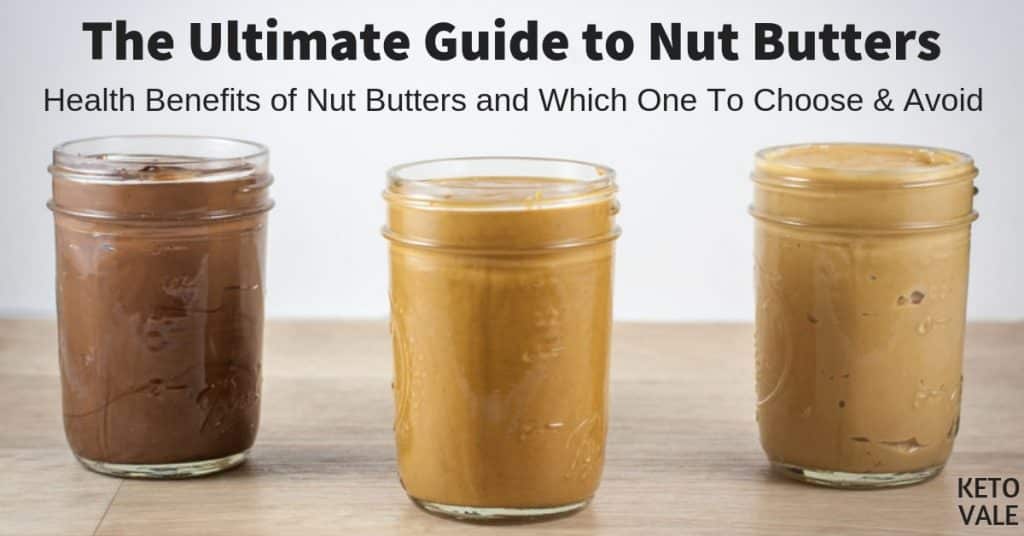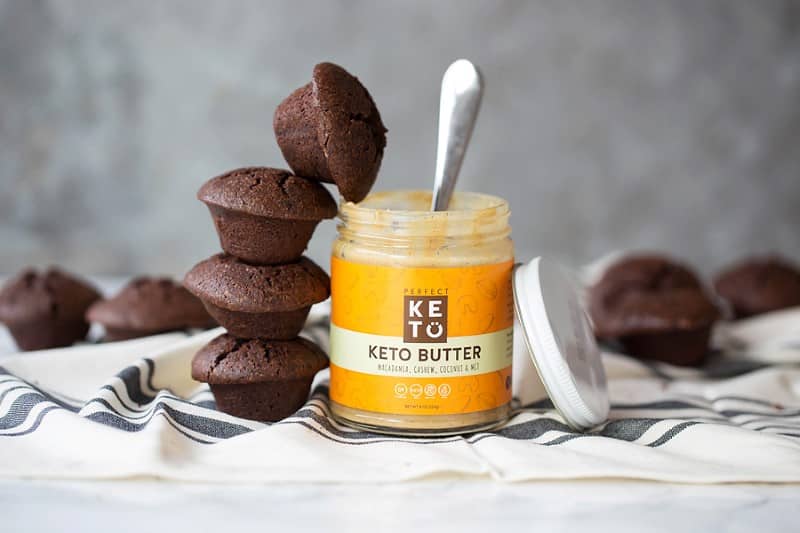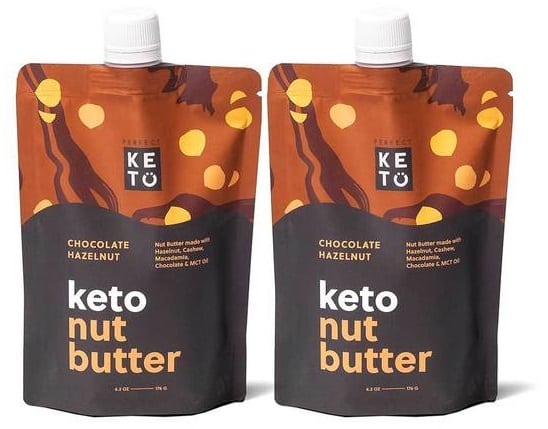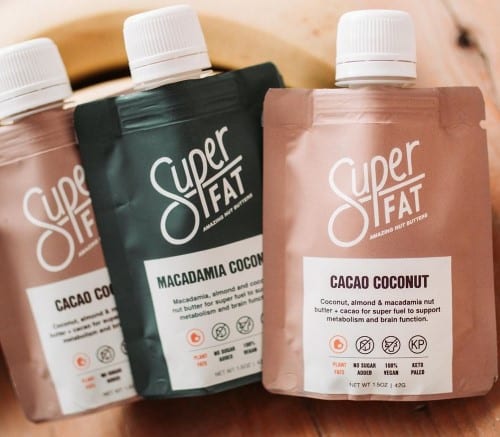Be honest. Is there anything tastier than a good nut butter? We think not. But if you’re on the ketogenic diet, then nuts are something you should use sparingly.
- What is Nut Butter?
- Health Benefits of Eating Nuts and Nut Butters
- #1. High in Healthy Fats
- #2. Reduces The Risk of Coronary Heart Disease
- #3. Supports Cellular Function
- #4. Lowers Cholesterol
- #5. High in Magnesium, Potassium, and Calcium
- #6. Increases Your Lifespan
- #7. Improves Digestive Health
- #8. Controls Blood Sugar Levels
- #9. Supports Weight Loss
- #10. Enhances Your Brain Power
- When Are Nut Butters NOT Good For You?
- Best Nut Butters To Eat on A Ketogenic Diet
- Best Keto Nut Butter Brands
- How To Use Nut Butters on the Ketogenic Diet
- Conclusion
While nuts are packed full of vitamins and minerals, they also tend to be high in carbohydrates, which can potentially kick you out of ketosis if eating too much on top of your other meals.
Luckily, not all nuts are off limits and you don’t have to limit your intake of all of them. Some make a great addition to your keto diet while adding to your fiber, antioxidant, vitamin and mineral count.
The trick is to stick with ones that are low in carbs and supply a good amount of healthy fat for your diet.
In this article, you will find the best and healthiest nut butters to add to your ketogenic shopping list and which ones you should stay away from.
What is Nut Butter?
Nut butter involves the process of grinding down nuts into a paste until they retain a butter-like consistency that’s easy to spread. The process usually involves soaking the nuts overnight so that they’re easier to break down, rinsing them, and then grinding them.
If you have a high-speed blender, then you can make your own nut butters at home. You can also use seeds and turn them into a butter, too.
Many store-bought brands of nut butters contain hidden ingredients that you want to avoid, such as vegetable oils, refined sugar, and more salt than you need.
Because of this, it’s best to buy a brand of nut butter that contains raw or roasted nuts and nothing else except for sea salt to enhance the flavor.
Sugars, oils, and other food stabilizers or preservatives should be avoided. You also want to make sure your nut butters come from organic, non-GMO sources of nuts to ensure you’re getting a clean, nutrient-dense food, if you want the best for your health.
The million dollar question that most people on the ketogenic diet ask is: are nut butters keto-friendly?
The answer is yes, with some shades of gray.
Most nuts tend to have more fat than carbs, which makes them a great addition to your keto meal plan as they can fill you up and cause you to eat less throughout the day. They’re also full of vitamin E, fiber, and minerals that your body needs to stay strong and healthy.
Health Benefits of Eating Nuts and Nut Butters
As we mentioned above, nuts are a great source of vitamins, minerals, fiber and antioxidants which is great for the ketogenic diet.
Here are some proven health benefits of nut butters and why they make a great addition to your keto diet.
#1. High in Healthy Fats
Research shows that nuts are one of the richest sources of healthy fats in the plant world. Their fat content ranges from 46% in cashews and pistachios to 76% in macadamia nuts, but it’s the type of fat that matters (1).
Most nuts are relatively low in saturated fats (4% to 16%) and high in monounsaturated fatty acids, such as oleic and linoleic acids.
We’re not saying that saturated fats are bad, as we clearly know by now that the myth that fat is bad for you has been debunked (2).
But the monounsaturated fats in nuts have remarkable anti-inflammatory properties, which makes this the type of fat that you want most of (3).
Some nuts such as walnuts contain both monounsaturated and polyunsaturated fatty acids, including linoleic acid, ALA, and omega 3 fatty acids. Not to mention, being high in fats helps you stay in ketosis where you burn the most fat.
#2. Reduces The Risk of Coronary Heart Disease
In addition to healthy fats, nuts contain other healthy bioactive compounds that have been shown to reduce the risk of coronary heart disease (4).
For example, many nuts are high in the amino acid l-arginine, which is the precursor for nitric oxide (5).
Nitric oxide helps expand the blood vessels to prevent clotting and help improve circulation so that your heart doesn’t have to work as hard to pump blood throughout the body.
#3. Supports Cellular Function
Nuts are a good source of folate, which is a B vitamin that is needed for the maintenance of normal cellular function. It also plays a role in the detoxification of a sulfur containing amino acid called homocysteine that has atherothrombotic properties (6).
Additionally, nuts contain large amounts of phenolic compounds and vitamins that act as antioxidants in the body to protect against oxidative stress and free radical damage.
Almond as especially high in α-tocopherol, which has numerous benefits that protect your cells (7).
Walnuts contain a good source of γ-tocopherol, which has amazing anti-inflammatory properties to help keep your cells healthy (8).
#4. Lowers Cholesterol
Nuts are naturally a cholesterol-free food, but they can also help reduce cholesterol levels in the body. This is because they are high in phytosterols, which interfere with cholesterol absorption to help reduce your overall levels (9, 10).
#5. High in Magnesium, Potassium, and Calcium
Nuts are a great source of certain minerals, including calcium, potassium and magnesium, which have been shown to protect against heart disease, bone demineralization, hypertension, and insulin resistance.
Nuts that are highest in these three minerals include almonds, brazil nuts, cashews, pistachios, hazelnuts and macadamia nuts.
Related: Best Low-Carb Foods That Are High in Magnesium
#6. Increases Your Lifespan
According to one study, people who eat nuts regularly are less likely to die from major chronic diseases, including cancer, heart disease, diabetes, and respiratory diseases (11).
#7. Improves Digestive Health
Eating nuts has been shown to impact gut microbiome in a beneficial way. Specifically, walnuts have been linked to an increase in butyrate in the gut which is needed to help maintain a healthy colon.
One study even found that eating walnuts can help prevent colon cancer. This is likely due to the high amounts of fiber, antioxidants, and anti-inflammatory fats that nuts contain (12).
#8. Controls Blood Sugar Levels
Research shows that nuts contain compounds that favourably influence glucose homeostasis.
FIber is one element of nuts that may contain anti-diabetic properties. This is because fiber helps slow down the rate in which glucose is dumped into your bloodstream. The polyphenols in nuts may contain further anti-diabetic properties by altering gut bacteria (13).
According to a meta-analysis of 12 studies, patients with type 2 diabetes who ate a diet high in nuts improved their glycemic control (14).
Another study found that a high consumption of nuts (especially walnuts) was linked to a lower risk of diabetes (15).
#9. Supports Weight Loss
According to a five-year study that evaluated more than 373,000 people, eating nuts can help reduce weight gain (16).
This is likely because nuts are high in fat that helps keep you full. But because they are also high in calories, you’ll want to keep your portion sizes in check.
#10. Enhances Your Brain Power
Can eating nuts make you smarter? Some research says it can.
According to one study, nuts help increase your brainwave frequencies to help improve areas such as healing, learning, cognition, perception, rapid eye movement during sleep, and memory (17).
When Are Nut Butters NOT Good For You?
Nuts and nut butters are tricky because they can contain harmful hidden ingredients. Food manufacturers like to add sugars, oils, and other preservatives to their nuts and nut products to make them taste better and extend their shelf life. This is especially true of nut butters. Because they are processed, they tend to go bad quicker. So food companies try to work around this by adding preservatives.
Here is a quick list of things to look out for when picking out nut butters:
#1. Added Sugar
If a nut butter contains added sugar of any kind, then don’t buy it. First of all, nuts don’t need sugar. They are plenty tasty without it. And as we know, too much sugar will kick you out of ketosis. It also contributes to inflammation and should be avoided whether or not you follow the ketogenic diet.
Check your nut butter’s label to make sure there are no sugars, high fructose corn syrup, or sweeteners of any kind. If it does, pick another kind or make your own at home.
#2. Partially Hydrogenated Oils
As you probably already know, some oils are good for you, especially on the ketogenic diet.
Olive oil and coconut oil provide a good source of anti-inflammatory fats.
But vegetable oils contain partially hydrogenated oils that need to be avoided. They cause gut inflammation and make it harder for you to absorb nutrients from other food.
They cause gut inflammation and make it harder for you to absorb nutrients from other food. Avoid soybean, canola, and vegetable oils at all costs and stick with natural oils that occur during the grinding process.
#3. Low-calorie or Low-fat Nut Butters
Nuts are perfect just the way they are. There is no need to change up their nutritional content. Be wary of any nut butter product that labels itself as a low-calorie or low-fat nut butter.
This means that they have probably chemically altered the butter to take out some of its fat content and then added in sugar and vegetable oils to alter their taste and nutrient profile. Stick with the real stuff and you won’t go wrong.
A note about peanut butter:
Peanuts belong to the legume family. Unlike real nuts, such as almonds and walnuts, peanuts may cause inflammation in some people. This is one of the reasons why some people choose to avoid eating peanuts on a ketogenic diet.
They contain anti-nutrients or compounds that stick to your gut mucosa and inhibit the absorption of certain minerals. When you add vegetable oils and sugar to the mix, peanut butter is one concoction you want to stay away from.
On keto diet, peanuts and its butter are a personal choice. Some people choose to eat it, some don’t. If you want the best nut butter for keto and health, continue reading!
Related: A Guide to Eating Nuts on a Ketogenic Diet
Best Nut Butters To Eat on A Ketogenic Diet
The trick to incorporating nut butters into your ketogenic diet is to pick ones that are lowest in carbohydrates and high in good fats. Here are some that make the keto cut.
#1. Macadamia Nut Butter
You’ll pay more money for macadamia nut butter because macadamia nuts are more expensive, but it’s so worth it. Macadamia is the perfect keto food.
They contain 75 percent fat and only 1.5 grams of net carbs, which means you can eat it freely without having to worry about your carb intake as much as you would with other nuts.
Research shows that a diet high in macadamia nuts reduces LDL “bad” cholesterol in both men and women to reduce the risk of cardiovascular disease (18).
Try adding some to your homemade keto bombs or bars.
If you are looking for the best keto-friendly nut butter, check this Perfect Keto’s Nut Butter!
#2. Walnut Butter
Walnuts are the only nuts that contain a good amount of omega 3 fatty acids, which are needed to fight inflammation, keep your brain and heart healthy, and more. Plus, they’re tasty and make a great addition to your keto diet. A one-ounce serving contains 18 grams of fat and only two grams of net carbs.
Research shows that walnuts are so healthy because they help promote the good bacteria in your gut, which is like your centers for disease control area (19).
If the gut isn’t happy, nothing in your body will be happy!
#3. Pecan Butter
Pecans have an undeniably unique taste that you can’t duplicate with any other food. Plus, they’re good for your heart. One study found that people who eat a pecan-rich diet have a lower risk of developing cardiovascular disease (20).
A one-ounce serving contains 20 grams of fat and 1.2 grams of net carbs, so be sure to add pecan butter to your favorite dishes to boost the fat content or eat it as a snack along with some celery sticks.
#4. Almond Butter
Almond butter is one of the most versatile foods you’ll ever eat. It has a mild taste that you can add to just about any recipe. It goes well in smoothies, alongside berries, or on celery sticks. You can even eat a scoop right out of the jar and it will be tasty and filling every time.
Almonds are also one of the most researched nuts around. Their health benefits are well established and include reducing central adiposity, preventing cardiovascular disease, reducing cholesterol, and improving glycemic control (21, 22, 23).
#5. Hazelnut Butter
Hazelnuts are a great addition to the ketogenic diet. No, we’re not talking about Nutella here. We mean the real hazelnut butter, which contains 17 grams of fat and two grams of net carbs per serving.
Research shows that hazelnuts are a good source of proanthocyanidins, which has antioxidant and anticancer roles in the body (24).
They’re also high in fiber to help keep you full and control blood sugar levels. Try adding some to raw cacao powder for a chocolate keto treat.
#6. Cashew Butter
Cashews are one of those nuts that are approved on the ketogenic diet because of their high fat content, but they also don’t have a lot of fiber in them, which increases their net carbs. So you’ll want to keep your portion sizes to a minimum when you indulge in cashew butter.
A one-ounce serving contains 14 grams of fat and seven grams of net carbs. Like other nuts, cashews have been shown to reduce the risk of cardiovascular disease (25).
They may also provide an anti-diabetic effect on the body (26).
#7. Seed Butters
Ok, so we know that seed butters are not the same as nut butters, but they are high in good fats and low in carbs, so they deserve a spot on our list.
For example, a serving of hemp seeds contains 15 grams of fat and only one grab of net carbs. Sunflower seed butter has nine grams of fat and 2.8 grams of net carbs per serving.
Other good choices include pumpkin seed butter and sesame seed butter (tahini). Be sure to read the label for exact macronutrient measurements so you can keep track of your carb intake as seeds tend to be a bit higher in carbs.
#8. Brazil Nut Butter
One ounce of Brazil nuts contains 19 grams of fat and 1.4 grams of net carbs. You won’t find too many Brazil nut butters at your local grocery store, so you might have to make these at home. But if you can swing it, all the nutrition is right there for you to load up on.
Research shows that a single consumption of Brazil nuts improves your lipid profile (27).
#9. Coconut Butter
If you love coconut, coconut oil and everything coconut then coconut butter is something you should try. Coconut butter is not the same as coconut oil. The butter is made from coconut meat whereas the oil is just the pure fat extract of the meat.
Coconut contains medium chain triglycerides, one of the healthiest types of fats that is used to make the best MCT Oils, which is a great addition to your keto diet.
Best Keto Nut Butter Brands
#1. Perfect Keto
Perfect Keto Nut Butter comes in three different flavors: chocolate hazelnut, almond butter and jelly, and snickerdoodle.
A two-tablespoon serving of the chocolate hazelnut flavor contains 170 calories, 16 grams of fat, 10 grams of carbs (3 grams net carbs), 4 grams of fiber, and 4 grams of fiber.
The ingredients are 100% keto-friendly (and tasty!) and include hazelnuts, coconut, almonds, cashews, chocolate chips, erythritol, stevia, cocoa powder, and MCT oil.
The come in a convenient travel-size package with a resealable screw-on top. It does not contain peanuts, added sugars, or artificial sweeteners.
Take some with you during the day and squeeze some into your mouth when you need an energy boost. You can also drizzle it over your favorite keto desserts.
Pros
- Comes in three delicious flavors
- Does not contain added sugars, artificial flavors, vegetable oils
- Sweetened with stevia and erythritol
- Comes in a resealable travel pouch
Cons
- Only contains two or three pouches per pack
Where to buy: Check best price here!
#2. SuperFat
SuperFat Keto Nut Butter comes in five different flavors: macadamia coconut, cacao coconut, macadamia MCT and probiotics, coffee and MCT, and protein.
At the time of this writing, they also offer a limited edition holiday flavor of cocoa mint.
One pouch of the macadamia coconut nut butter contains the following: 270 calories, 27 grams of fat, 8 grams carbs (3 grams net carbs), 5 grams of fiber, and 6 grams of protein.
The ingredients include macadamia nuts, almonds, coconut butter, and pink Himalayan salt. That’s it.
SuperFat nut butters also come in a resealable pouch for convenient on-the-go use. We like the addition of probiotics, coffee, and sunflower protein powder in some of their products.
Pros
- They offer nut butter options without added sweeteners
- There are five flavors available
- They use high-quality ingredients that are 100% keto-friendly and include probiotics, sunflower protein, coffee, and MCT oil from coconuts (not palm)
- Comes in a resealable travel pouch
Cons
- Can be expensive
Where to buy: Shop Now!
How To Use Nut Butters on the Ketogenic Diet
Most people like to use nut butters on their fruit, but since fruit is off-limits on the ketogenic diet (with the exception of berries), you’ll want to find other ways to incorporate nut butter into your diet. Here are some suggestions:
#1. Add to a smoothie
If you’re looking for a quick breakfast, try adding a few tablespoons of nut butter to a keto-friendly smoothie that contains spinach and berries to get some fiber and antioxidants in your diet.
#2. Eat raw with celery sticks
Celery sticks are a excellent keto vegetable because they contain almost no calories or carbs, and they have a high water content. So you’ll be flushing toxins from the body when you dip them in your favorite keto nut butter and enjoy them as a mid-afternoon snack.
#3. Incorporate them into your fat bombs
Fat bombs are a great way to boost your fat intake and ketone production. If you’re feeling low on energy, try adding one of the above-mentioned nut butters to your current fat bomb recipe. You can also use these as an on-the-go breakfast when you don’t have time for bacon and eggs.
#4. Add to vegetable and meat-based dishes as a thickening agent
Sesame seeds, in particular, go really well with meat and vegetables. If you’re making a stir-fry, try throwing some tahini in there to thicken things up and increase the fat and fiber content.
#5. Put them in homemade keto bars
If you need a quick snack and don’t like any of the current keto bars that are offered on your local grocery store’s shelves, then try making your own at home. Combine some nut butter, seeds, coconut oil, raw cacao powder and stevia for a snack that will get you through to the next meal.
Conclusion
Nut butters make a great addition to the ketogenic diet. You just have to know which ones are OK to eat and which are off limits. You’ll also want to know what to avoid when picking out a store-bought brand of nut butter. Refined sugars, hydrogenated oils, and preservatives are some of the ingredients that lurk in most brands.
You can avoid these ingredients by making your own nut butter at home using a high-speed blender, or look for brands that don’t contain these additives.
Our top choices for keto-friendly nut butters are macadamia, pecans, almonds, Brazil nuts, and even some seeds. Add some to meat and vegetable-based dishes to thicken things up, add them to homemade bars or fat bombs, or enjoy them raw as a snack.
See more: Almond Butter vs. Peanut Butter on Keto










